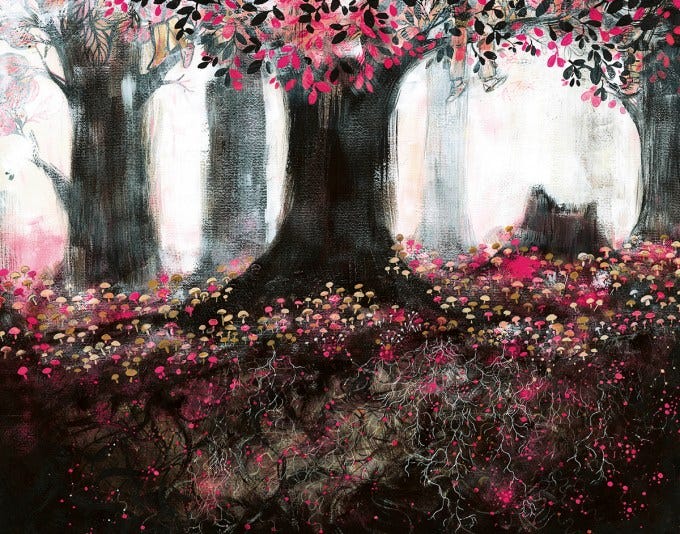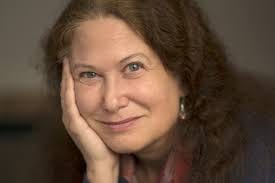What does poetry work in us?
Igniting a conversation about the relationship between poetry, science, and flourishing with a modern master, change-maker, and wise and winsome voice

What does poetry work in us?
For years, this has been a vast and aching and generative open question in my life, an instrument of transformation.
Brian Eno once wrote about "...the excitement of witnessing events too momentous for the medium assigned to record them." Part of my own exhilaration with poetry is that it is a mightier medium for the indescribable experience of living in this world. Indeed, Donald Hall's "unsayable said."
Poetry is a more capacious form of words. Poetry calls for a figuring attention, it complicates, it unsettles. It induces a crisis state, where the structures for thought you arrived with are inadequate and a void now exists. It is in this void that emergence is possible, the arising of something new. We've written that this unsettledness, perpetually being beyond equilibrium and certainty, is a feature of flourishing and it is encounters with flourishing that we are after. So I wanted to bring poetry here, to start a conversation about its role and relationship to flourishing. Besides, we write and read poems because we need them.
Books of poetry grace every counter, side table, and desk of our house, floors near the sideboards of most rooms, in the car, and in any backpack, diaper bag, or stroller. My daughter and I have read poetry together over breakfast every day since she was one (she's almost three now). One of the mainstays and among our favorites of those morning reads has been Jane Hirshfield’s collections. I recently had the opportunity to talk with Jane on Origins Podcast, where she shared some of her poetry and a great deal of herself (she is, above all, generous beyond measure). I can think of no better poet to ignite this conversation than this master, change-maker, and wise and winsome voice.
A note on reading poetry
In Japan they have a notion of yutori, or a kind of living with spaciousness. The poet Naomi Shihab Nye spoke about a way of defining yutori a child she worked with in Japan shared with her, "And after you read a poem, just knowing you can hold it. You can be in that space of the poem, and it can hold you in its space, and you don’t have to explain it. You don’t have to paraphrase it. You just hold it, and it allows you to see differently."
Poetry is a clarion call for a different sensibility; a problem-solving, progress-oriented mind will be lost in a poem and the poem lost on it. A better approach is to sit in the space of a poem and watch what it works in you. The French philosopher, Bernard Steigler, writes that attention is ‘waiting,’ waiting on the disclosure of the long webs of connectedness that are in the object that are mirroring the rich long webs of connectedness that are in you. It is a beautiful way to approach a poem.
Jane herself writes, "The completion of a poem is in the person reading it." So, here are some of the poems Jane brought to our conversation and that the conversation drew out of her. And with them is my invitation to read them with your whole being, all of your attention, and to let them be finished in you. If you are moved to share your thoughts on poetry or its relationship to flourishing, please leave a comment.
The poems that follow are excerpts from my conversation with Jane in early 2024. You can find the full recording at OriginsPodcast.co (https://www.originspodcast.co/episodes-1/hirshfield).
"My Skeleton"
One thing Jane does in her poetry is invite us to embrace habits of deep noticing and attention — and witness the way that attention transforms even the mundane and allows beauty to unfold in its place.
"My Hunger" & "I Sat in the Sun"
Desire is what stretches one into the person they will become (and collectively, into the people and the society we will become). Jane's poetry addresses a great deal this notion of 'hunger.' On the page it is something more like yearning, perhaps, because it has both the kind of spiritual and existential component, yet, like much of her work, it is experienced through the more ordinary, the very corporeal act of hungering for food.
She tells me that hunger is our most fundamental need and connection to being alive; in the most foundational way, our agreement to life. Allegiance to feeling whatever it is we are going to feel if we are going to be alive in this world. Jane offered another poem emergent from our conversation: "Possibility: An Assay."
Poetry and science
Jane's poems and life increasingly reflect her long-standing interest in science and the meeting places with poetry. It is exhilarating to me, important to me, that she has created a connection between science and poetry, embracing their collectivity. So profound do I believe her effect to have been that I consider her to be in the lineage of Rachel Carson. In 2017 Jane organized the first Poets for Science gathering, a component of the Washington DC March for Science held on Earth Day. It remains a participatory project and a meeting place for different ways of knowing. She shared perhaps her earliest poem that is steeped in the language of the sciences.
Complement this with her poem "On the Fifth Day," which tells the story of how, when, and why she could no longer remain silent about the silencing of scientists and science in 2017.

Poetry and flourishing
Jane Hirshfield writes that the power of a poem is to entrance and to break entrancement to which Elizabeth Alexander might add that poetry has always existed in a communal context. Both suggest that perhaps healthier relationality depends on more of the world welcoming and cultivating a poetic sensibility. Wendell Barry has some advice that I revisit weekly: "How to be a Poet."
But it was another aspect of flourishing that reverberated through Jane and I's conversations and in my thoughts since: poetry creates real conversation (in the way David Whyte means it). We began this essay by discussing the way poetry unsettles. Poetry calls attention to the settled, disrupting it, demanding a new conversation and a search for a new comprehension. Perhaps that is why hunger is such a part of Jane's poetry, a yearning for what is outside of the existing comprehension, outside of our world image. And her poetry takes us to that beyond.
I'll be sitting in the space of these poems and this conversation for months and I imagine they will return in our thinking about flourishing. For now, I'll appropriately leave you with one final poem: "Keeping Quiet" by Pablo Neruda.
Now we will count to twelve
and we will all keep still.
For once on the face of the earth,
let’s not speak in any language;
let’s stop for one second,
and not move our arms so much.
It would be an exotic moment
without rush, without engines;
we would all be together
in a sudden strangeness.
Fisherman in the cold sea
would not harm whales
and the man gathering salt
would look at his hurt hands.
Those who prepare green wars,
wars with gas, wars with fire,
victories with no survivors,
would put on clean clothes
and walk about with their brothers
in the shade, doing nothing.
What I want should not be confused
with total inactivity.
Life is what it is about;
I want no truck with death.
If we were not so single-minded
about keeping our lives moving,
and for once could do nothing,
perhaps a huge silence
might interrupt this sadness
of never understanding ourselves
and of threatening ourselves with death.
Perhaps the earth can teach us
as when everything seems dead
and later proves to be alive.
Now I’ll count up to twelve
and you keep quiet and I will go.

